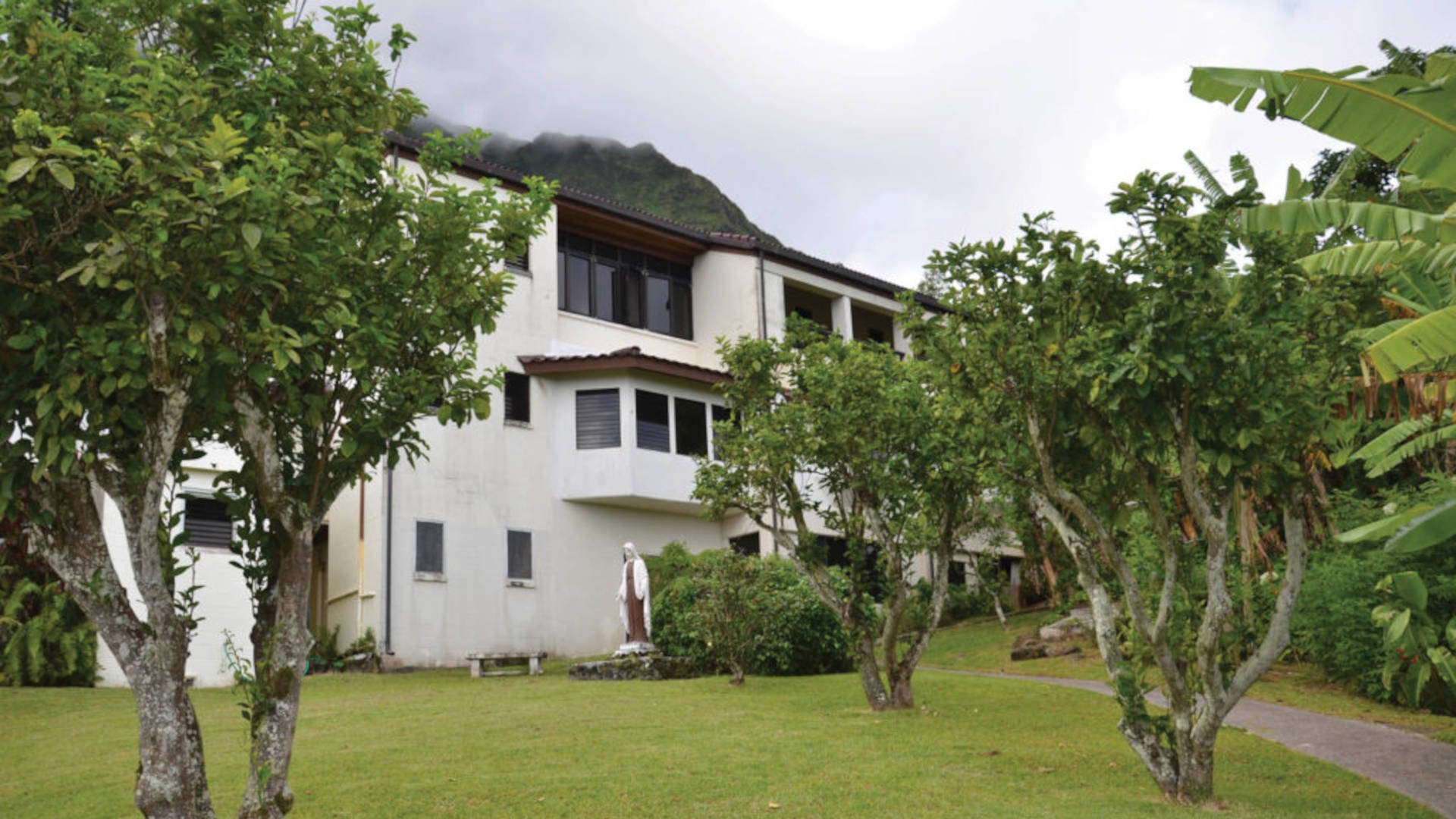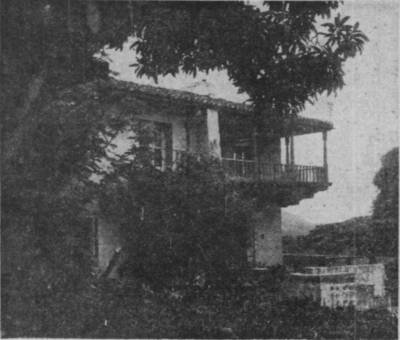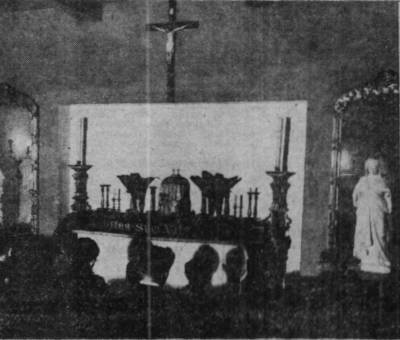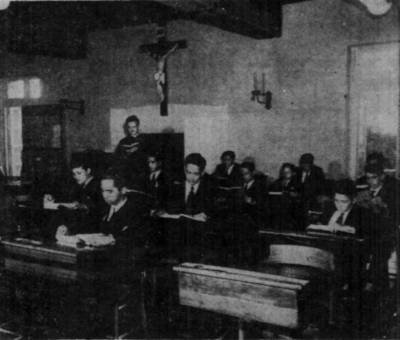Diabolical Obsession at St. Stephen’s Seminary
Diabolical Obsession at St. Stephen’s Seminary
In 1929, Harold K.L. Castle built his grand mansion on a 20-acre estate at the base of the Pali. 500 feet above sea level, the estate had a steep cliff face jutting up to one side and sweeping views of the Windward coast on the other. When it was built, the Pali highway hadn’t yet been built and a narrow road wound its way through a thick forest of bamboo and banyan trees. That little road crossed over Kahana‘iki stream before opening to a wide courtyard exposing a grand home that seemed to be magically suspended from the slopes of the Pali. The 25-room mansion, its supplementary buildings, garages, kennels, and mountain road were built at a cost of about $300,000.
Known as Paliku, the home entertained such celebrities as Spanish nobility, war heroes, and Hollywood film stars.
But after only 17 years, in June of 1946, the Castle family sold the estate to the Roman Catholic Church for only $200,000. The estate then became St. Stephen’s Seminary. Part of the building, with its mirrors and Venetian candlesticks became the seminary’s chapel. The private library became the main classroom. And one wing of the top floor was screened in and became the dormitory where the teenage seminarians and their teachers, priests the boys routinely called “Father” slept. Each seminarian had a bed, a chair, and on top of the chair, a stainless steel washbowl about 4-5 inches deep. The dorm looked out at the Pali slopes that were barely a stone’s throw away.
The boys were sleeping in their beds one night in October of 1946. From high up on the hill, a sound could be heard in the distance. One priest described it as a tapping. Another, more like a clicking. A methodical clicking. It came closer and closer, edging down the mountain like a swollen river.
Father Cullinen, listened, transfixed, as whatever was causing the tapping came closer and closer, then entered the room. Suddenly, the stainless steel basins came alive. The tapping rattled the bowls, up and down the row of beds, faster and faster. Then the tapping went back up the mountain.
Father Cullinen watched as this happened several times that night. The clamor was so loud that it woke the young men from their slumber. All except one. This one young seminarian slept through the entire racket, but he was not left undisturbed.
His neck started to swell up to the size of a grapefruit. Father Cullinen put a crucifix next to the sleeping boy’s neck and the swelling subsided.
The presence responsible for the earlier tapping came to a stop at the boy’s bed. Father Lin and Father Cullinen watched in horror as the boy’s body was pushed deep into the bed, then brought back up, over and over again. He didn’t levitate or actually leave the bed. It was as if he was pressed deeper down by a strong man, then released.
Yet, through all of this, no one and nothing visible, was there. Then... whatever it was left the boy alone.
But it wasn’t gone.
Down a spiral staircase from the dormitory was a huge kitchen. Father Cullinen said they soon heard the sound of pots and pans and dishes being thrown around - a cacophony of sound. When the noise stopped, they went down to investigate: dishes, pots, and pans were strewn all over. Soon after, then-bishop James Sweeney came out and closed the seminary because of this incident. Sweeney requested the priests not to discuss what they witnessed. Only when they were asked years later to describe what really happened, they finally opened up and told the tale.
In 1961, Retired Bishop of Honolulu, Joseph Ferrario, said he understood a blessing was done but it probably wasn’t an exorcism. The boy, who slept through what has now been termed a “diabolical obsession” never returned.
Seminarians have long talked of attacks by levitating pencils, of doors that would stick on one side but not the other, of pots that rattled without cause. Even laypeople who work at the religious institution talk of feeling a presence, hearing a voice, having something press against them.
We hear about Diabolical Possession all the time. It’s in books and movies, it’s everywhere. But Diabolical Obsession is a bit different. There is no taking over the body and causing harm within the person. According to the Church, Diabolical Obsession refers to hostile action of the devil or an evil spirit besetting anyone from without. In this instance, the clattering of the bowls and dishes, the pressing of the boy into his bed.
Now, this isn’t just a ghost story that has been passed along. Whatever happened at the seminary, according to Ferrario, happened. There is no question about that.
“It was real,” he said, “Told and corroborated by prominent men in the Roman Catholic Church.”
Eventually, the seminary was closed and the place became St. Stephen Diocesan Center. It serves as the residence of the bishop of Honolulu and houses various offices of the diocesan curia.
So what was causing all the ruckus? Why did the Castle family sell their sprawling estate only 17 years after its creation? And why did they sell it to the Church for one hundred thousand dollars less than what they spent to build it? Was the family at Paliku having supernatural experiences before the sale? Being at the foot of the Pali, was the mansion built on the trail of the ghostly night marchers? Was it the menehune causing trouble as they travel through this place on their way to their destination? Were the spirits of the warriors from Kaleleake‘anae disturbed by the mansion being built where it was? Did the builders happen to disturb the bones of the dead? Perhaps the spirits of those many who lost their lives in falls, crashes, accidents, murder, or suicide happened to culminate in that area. Or... Did this young seminarian bring something unseen with him to the seminary?
Who knows?
TAKE A GHOST TOUR WITH LOPAKA IN PERSON!
Check out our TOURS page and schedule your date with Hawaii's longest-running ghost tour! Visit some of Hawaii's Most Haunted sites with The Ghost Guy himself!






